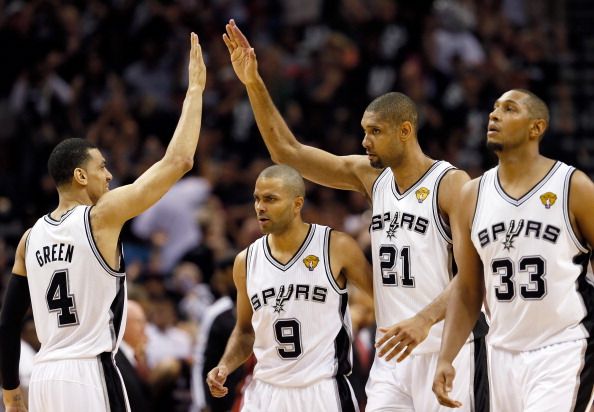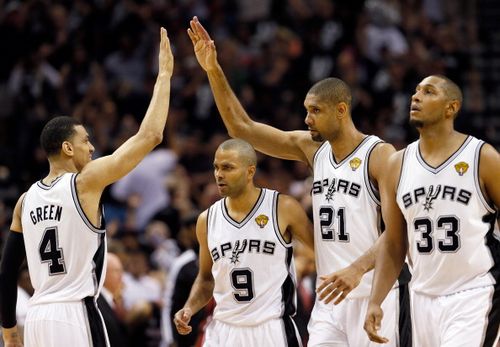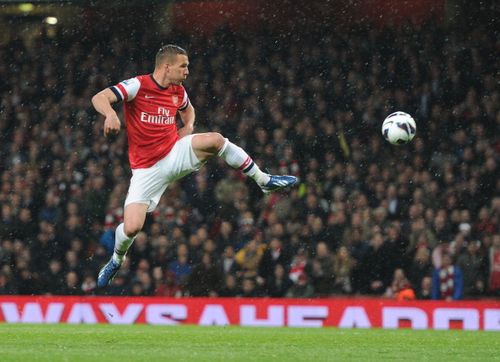
What Arsenal can learn from Spurs

I refer, of course, not to Tottenham but to San Antonio. Yes, those Spurs lost to the Miami Heat in this year’s NBA championship, but the San Antonio Spurs’ approach has achieved such a track-record of success that it offers important lessons to franchises in any sport.
We talk of the Arsenal Way and of how Arsenal have redefined how football is played in England, and it’s not for nothing that the Spurs have dominated how basketball is played in America (to clarify the issue moving forward, “the Spurs” refers to the American basketball team; any use of “Spurs” without “the” would refer to the lily-livered Lilywhites from White Hart Lane).
Since 2003, the Spurs have won the NBA championship four times—that’s four out of ten—and finished in second place once (this year). The remaining six championships have been split among five different teams. For the sake of this argument, we’ll treat the Los Angeles Lakers, winners of two championships, as the league’s equivalent of Manchester United, and the Miami Heat, winners of the last two championships, as the league’s equivalent of Manchester City or Chelsea.
The Lakers have a pedigree and a glamour to them; they’re a flagship franchise and can count on that prestige to lure the league’s best players to play for them. The Miami Heat are the nouveau riche club that has suddenly, through a few dramatic high-profile signings, vaulted to the top of the league. However, under the league’s strict salary-cap, the Lakers and Heat find themselves locked into long, expensive contracts that make it all but impossible to sign enough players of quality to sustain their success over the long term.
The current divas of the NBA, the Miami Heat, have built a squad for short-term success, and it looks to have worked to the tune of three consecutive appearances in the the NBA finals and two consecutive championships. Their Big Three of Dwayne Wade, Lebron James, and Chris Bosh are talented enough to carry a team filled with wash-outs and minor talents, but their contracts make long-term success all but impossible to sustain.
Already, there are significant questions about Wade’s age and Bosh’s future with the team, but there’s little that the club can do to address this. The gap in talent between the three players and the rest of the squad is immense, and even after two championships, it seems difficult to convince good players to accept less money for what might amount to a guaranteed championship. As a result, they may have to dismantle the current squad and attempt to rebuild sooner rather than later.
By comparison, the Spurs are a model of fiscal restraint. Yes, they have built around three incredibly talented players, but they have built a system whose success depends far less on the players. Their manager, Gregg Popovich, is among the most-respected in the league, and his teams just win. Aside from Tim Duncan, almost all of the squad’s players have been late picks in the draft (teams select first-year players in a draft based, roughly, on worst-to-first, so a team like the Spurs that frequently finish in first place essentially choose last. There are some wrinkles, but let’s focus on the larger picture).
The Spurs, like Arsenal, thrive on finding obscure talents and transforming them, most notably Tony Parker, the 28th pick of the 2001 draft, and Manu Ginobili, the 57th pick of the 1999 draft. The rest of the Spurs’ roster is frequently a mix of seasoned veterans, such as Michael Finley or Terry Porter, and promising young players, such as Kawhi Leonard or Danny Green.
The difference between this roster and that of the Heat or Lakers is that the Spurs seem to assemble players based on thorough scouting. Instead of settling for who’s available, the Spurs make shrewd signings that address their needs. Instead of ending up with aging carpetbaggers hoping to sit on the bench and collect a championship, the Spurs stand apart by their ability to consistently identify those players who are most likely to contribute. Then, through the system and the coaching that Popovich and his staff provide, those players actually go on to contribute—all according to a plan.

Therein lies the key: a plan. All too often in recent years, we seem to have approached the transfer-windows with diffidence or a lack of purpose. When we knew that van Persie or Fabregas wanted to leave, for example, a key signing or two might have convinced him to stay (if it was ever possible to do so). The best we could do was Lukas Podolski, not enough to sway van Persie. When it became clear that Fabregas wanted to leave (and we would have £30m or more to spend on replacements), we brought in Mikel Arteta, who has turned out to be a wonderful addition. But for £60k a week or so, he’s still a budget-minded buy rather than a direct replacement.
The signing of Nacho Monreal may not have happened at all if Gibbs had not been injured. We all know that Arsenal has worked within its budget for years now, and this is not a call to suddenly spend like it’s going out of style. But there have been too many puzzling signings and far too few defining signings to convince us that there is a larger plan beyond fiscal stability. Instead of going out and acquiring the biggest names available, then, study the Spurs’ model: target those players most likely to address our needs. Higuain fits that model. Rooney, I’d submit, does not. Cesar? Yes, probably.
The transfer market is officially open, so I imagine we’ll see some announcements soon, and we’ll see then whether there’s a plan to move forward.